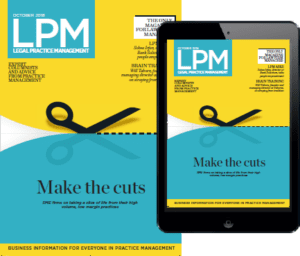
How small and SME law firms are approaching the future of work
The latest LexisNexis Bellwether Report revealed a range of new patterns emerging in work models across the UK’s legal sector – with distinct variations by firm size and composition.
Law firms are gradually phasing out what has been an 18-month long ‘work-from-home’ phase, and while a host of virtual and hybrid models have emerged in the meantime – some might actually return to business as usual.
Normality down the line
The latest LexisNexis Bellwether Report reveals that the majority of lawyers at small law firms are considering hybrid models – with employees expected in the office between two and four days per week.
That said, more than 40% of small and SME-sized law firms expect staff to be back in the office full time further down the line. The former bracket appears more traditional with more than half holding this vision of the future, compared to less than a third among SME law firms.
As such, most firms have no plans to change the size of their office space – as noted by one partner from among the respondents: “We are creatures of habit, particularly in this profession. People like working in a certain way, having files and paper surrounding them and so on. People like their own desk.”
Change at the top
Large law seems to have broken away from these habits. Despite the fact that nearly 25% of junior lawyers will likely work from the office full time now and in the future, several top 100 firms – including Clifford Chance, Freshfields and Linklaters – have all launched long-term hybrid working policies.
Staff at these firms can work remotely roughly 50% of the time, with some setting a weekly minimum number of office days.
Others have taken a different route. Late in August, Morrison & Foerster announced that being fully vaccinated will be mandatory for staff to return to its London office. Many firms in the US have introduced similar mandates, although UK-based firms have largely refrained from such policies.
Beyond legal
Economy-wide, workers in the UK want hybrid working to stay. Aviva research from July found that 70% of UK workers expect hybrid working will be the standard going forward, albeit without consensus on how many office days such a paradigm would entail.
Three days a week emerged as the most popular setup, although even this varies by gender and age. Men seem more in favour of going into the office than women, while older workers also prefer to work from home.
Businesses are still working out their best formula – recent data from the Centre for Cities shows only 15% of workers went back to the office in August. Some companies have even deferred their office return to the new year – tech giants Apple and Google will only resume in-office working by January 2022, for instance.
Flexible futures
As workers are unsure about what they want out of flexible working, law firms need to be clear and purposeful about their plans. For the full picture, read The Bellwether Report: The good, the bad and the new

How are training contracts in specialist law firms better?
Rachel Buckley, director and training principal, The Family Law Company on how to demonstrate to trainees that your SME law firm is worth the contract.
Don’t think small, think big!
Choosing the right law firm on your route to becoming a qualified solicitor can feel daunting. Any wannabe trainee knows that the competition for a training contract can be intense.
While many see a seat in a major city or international firm as a golden ticket to a successful legal career they shouldn’t overlook smaller niche firms. The roll call of clients and office feng shui may be impressive but the opportunities might not be what they anticipated. When considering the right training contract, bigger may not always be better.
Smaller business does not mean smaller career aspirations
Businesses like The Family Law Company offer a truly hands-on approach. With fewer lawyers, trainees get to work on a myriad of live matters, with responsibility for work that’s valued by both the business and its clients. Typical tasks include dealing with new enquiries, setting up case files, taking client statements, representing clients in hearings – and sometimes dealing with very sensitive information. There are abundant opportunities for learning vital skills, often at a faster pace than at a larger firm.
A strong public service ethos
Training in a small firm means they get to meet people from all walks of life and experience first-hand how the law actually affects these individuals. Unlike our larger peers, clients can literally walk in from the street asking for help. We’re committed to having a strong legal aid team – while it may not be the most profitable practice area, it’s a vital service for the most vulnerable of our society. Smaller firms often tend to play vital roles in their communities supporting local initiatives or charities. For us, this means assisting with Citizen’s Advice free legal clinics, and providing training for our local refuge.
Support when you need it
Working for a niche or specialist law firm definitely has strong advantages when it comes to support. Here, with over 40 family law professionals across the business, there’s always someone on hand to answer trainees’ questions. Ours is an open-door policy meaning that even in unexpected and difficult situations there is always somebody available to assist in reaching a solution. This also applies to progression. Good law firms will have succession and business plans in place and will nurture their trainees so that they grow with the needs of the business. Many of our directors started in entry level positions before they progressed to the boardroom.
Finding a balance
This is a topic discussed at length by trainee solicitors, perhaps even more so since the pandemic has led to an increased workload and pressure. While it would be unrealistic to say that smaller firms offer nine-to-five every day, there’s generally a healthier approach to the working day. A strong team ethos means that colleagues look out for each other and everyone can be more open, whether this is one colleague prompting another to take a lunch break, knowing you can speak up if you can’t take on any more work or the managers shutting the office an hour early if it’s been a tough week.
In a post-pandemic world having the right personal balance between office and home is going to increase, and the locations of smaller firms will make them even more desirable. Leave our Plymouth office and within 15 minutes you could be enjoying a dip in the sea.
The time for trainee solicitors to consider smaller law firms as viable firms for a training contract has definitely arrived. We may not all have the glitz of The Split, but our opportunities for progression, variety, experience and flexibility certainly rival those of our peers.

Competitive edge: Law of attraction

How secure e-bundling solutions strengthen law firm reputation
Most Popular

The leading annual picture of SME law firms' changing strategic priorities

Law firms undertaking identity verification checks must register as an ASCP

Robust onboarding processes are fundamental to effective risk prevention
TA Triumph-Adler provides tailored support to meet compliance requirements

Osprey Approach's webinar explores the benefits of a digital-first approach

Secure mobile printing is a smarter way for smaller legal practices to work

Small, specialist firms are taking on the world stage
Robert Coffey, managing partner at Cooke, Young and Keidan, says small, specialist firms are earning their place on the world stage by providing clients with an innovative, nimble, bespoke approach.
Small, specialist law firms are not a new thing. Indeed, it’s the global behemoth firms that are the more recent arrivals in the history of the practice of law. It may appear, at first sight, that the real difference between choosing a firm with a network of international offices versus a single-office specialist, is likely hourly rates. Often people think that, if they have an international matter, it makes most sense to go to a firm with offices in every relevant country. Not only are neither of these assumptions necessarily correct, but there are increasingly compelling reasons why the smaller specialist firms have been able to prove themselves as the best choice even for the most complex international matters.
Specialist firms can offer a conflict-free alternative to the largest firms, which may, for reason of actual or ‘commercial’ conflict, be unable or unwilling to act for a client on a particular matter. Indeed, specialist firms are often established by lawyers who have experience working in the largest firms, but who wish to offer a conflict-free alternative. And in addition to being conflict-free, the specialist firm may be able to act on matters where, for sanctions reasons, firms with a US nexus will be unable to act. The fact that a specialist firm may be single-office can be an advantage in an international matter. The specialist firm can pick and choose the best local lawyers with which to co-counsel on a matter, rather than being restricted to using only the offices within the firm’s own international organisation.
Small firms are ideally placed to take advantage of technology to level the playing field. They can identify and implement the technology most appropriate to a client’s needs at a speed that would be unthinkable at a large firm, and need not be tied to a narrow range of solutions. There’s a rapidly expanding range of software in the e-discovery and AI fields, for example, which can be implemented by even the smallest firms and which can greatly reduce the time, manpower, and cost needed to analyse large volumes of documentation. The experience of practicing law while subject to Covid-19 restrictions has proven, beyond doubt, that technology can play an even more central role than we may have previously thought. In litigation matters, hearings have continued remotely by video conference, including the giving of witness evidence from witnesses situated abroad. Much of the travel and requirement for in-person meeting previously thought essential has now been shown to be unnecessary.
Specialist firms are increasingly able to attract and retain the best talent from throughout the legal market. Junior lawyers are increasingly wary of becoming pigeonholed within a very narrow area of practice too early in their career (and thereby effectively becoming tied to a very large firm). They also actively seek out employment by specialist firms where they can expect to enjoy greater levels of responsibility at an earlier stage in their career, with less bureaucracy and more client contact. Overstaffing can be avoided by the specialist firm where everything and everyone – from software to lawyers – must earn its place on the client team.
Small, specialist firms are earning their place on the world stage by providing clients with an innovative, nimble, bespoke approach. A combination of the highest standards of legal practice and talent alongside a flexible approach to matter management has proved to be an unbeatable combination. Any small firm wanting to develop its international client base should think about how it can harness such existing strengths, and leverage existing or potential contacts in similarly-positioned overseas firms. This does not have to involve formal networks; having a deeper understanding of the strengths of possible collaborators in other countries will set a UK firm in good stead when international opportunities arise, as well as leading to broader potential for business development.

Competitive edge: Law of attraction

How secure e-bundling solutions strengthen law firm reputation
Most Popular

The leading annual picture of SME law firms' changing strategic priorities

Law firms undertaking identity verification checks must register as an ASCP

Robust onboarding processes are fundamental to effective risk prevention
TA Triumph-Adler provides tailored support to meet compliance requirements

Osprey Approach's webinar explores the benefits of a digital-first approach

Secure mobile printing is a smarter way for smaller legal practices to work




